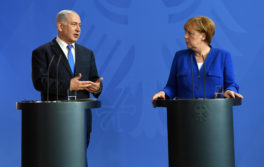Israeli Prime Minister Benjamin Netanyahu while visiting the country where the original Holocaust was first devised found some common ground with the host nation of Germany—opposing the current proponent of a new Holocaust, the Islamic Republic of Iran.
On Sunday, Iranian Supreme Leader Ayatollah Khamenei posted in English to Twitter, “Our stance against Israel is the same stance we have always taken. #Israel is a malignant cancerous tumor in the West Asian region that has to be removed and eradicated: it is possible and it will happen.” The shocking tweet included the hashtag “#GreatReturnMarch”, referencing the weekly Gaza riots near Israel’s border fence.
Speaking with Israeli ally and opponent of anti-Semitism German Chancellor Angela Merkel, Netanyahu alluded to the Holocaust in his condemnation of Khamenei’s comments. “This is amazing that in the beginning of the 21st century, somebody talks about destroying Israel. It means destroying another six million plus Jews,” said Netanyahu in comments with Merkel released by his office. “It’s quite extraordinary that this goes on, but this is what we face.”
It’s not only Israel that faces the Iranian threat. Netanyahu warned that Iran’s grander designs in Syria include an inter-Islam religious war between Shiites and Sunnis that would lead to an even greater refugee crisis for Europe.
The Israeli leader said Iran currently heads a militia of 18,000 Shiites in Syria that come from Afghanistan, Pakistan, and elsewhere with a desire to increase that number to 80,000. He said they have “a military goal, but also a religious goal.”
Netanyahu told Merkel that Iran wants to ”basically conduct a religious campaign in largely Sunni Syria. Syria is 96% Sunni, but try to convert Sunnis. This will inflame another religious war. This time a religious war inside Syria, and the consequences would be many, many more refugees and you know exactly where they’ll come.”
Not surprisingly, Netanyahu doesn’t want Iran in Syria any longer. Merkel, meanwhile, agreed the Iranian presence there is a concern.
“We feel we ought to make every diplomatic effort we can in order to address the ballistic missile program of Iran but also its activities in Yemen, the presence of its army in Syria, and to exert our influence in such a way that Iran is pushed out of this region, particularly a region close to Israel,” Merkel was quoted by CNN as saying in their report on the discussion with Netanyahu.
Netanyahu said that Iran’s abilities to wage war across the region was empowered by the economic relief accompanied by the Iran nuclear deal. In light of that, the Israeli leader called for renewed economic pressure on Iran.
“I think the economic pressure, economic sanctions on Iran, break this cash machine that feeds the Iranian empire that endangers everybody, endangers Israel, but indirectly also endangers Germany and Europe,” said Netanyahu. “Iran must not be allowed to have a foothold, a military foothold in Syria. Iran should leave Syria, all parts of Syria.”
Speaking of the Iran nuclear deal, Merkel and Netanyahu disagree on its impact. Europe is trying to salvage the accord after the Americans exited the deal last month. The Israelis, meanwhile, repeatedly called for the deal to be adjusted or set aside.
CNN quoted Merkel as saying her country has “a different opinion as to the usefulness of [the Iran deal] and its effectiveness, Germany did not cancel this agreement. Together with other European partners, we stand by it.”
Netanyahu and Merkel did agree, however, that Iran’s nuclear weapons research merited an investigation from the International Atomic Energy Agency (IAEA). This comes after Israel unveiled thousands of documents proving the existence of an Iranian nuclear weapons program.
“We think that it’s important, as Chancellor Merkel has said, that the IAEA investigate Iran based on this new information, a lot of new information that Israel has now provided the IAEA as well,” said Netanyahu.
“And it’s important to prevent Iran from getting a nuclear weapon. We commit, and I commit again, that we will not let that happen.”
(By Joshua Spurlock, www.themideastupdate.com, June 4, 2018)

